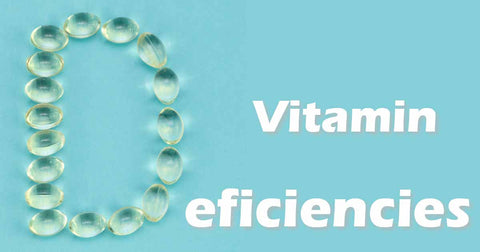Introduction
Vitamins are essential micronutrients that our bodies require in small amounts to perform various functions. They are involved in processes such as energy production, metabolism, immune function, and the maintenance of healthy bones, skin, and organs.
Vitamin deficiencies occur when our bodies do not receive an adequate amount of a particular vitamin. These deficiencies can arise due to various reasons, including inadequate dietary intake, poor absorption, certain medical conditions, or lifestyle factors. When we lack a specific vitamin, it can have a profound impact on our health.
The effects of vitamin deficiencies can vary depending on the specific vitamin involved. Some common symptoms include fatigue, weakness, impaired immune function, poor wound healing, hair loss, vision problems, and mood disorders. Prolonged deficiencies can lead to serious health complications and increase the risk of developing chronic diseases.
Addressing vitamin deficiencies is crucial to maintain optimal health and prevent associated complications. While a balanced diet should be the primary source of vitamins, sometimes supplementation becomes necessary to meet the body's requirements. In the following sections, we will explore the best supplements for specific vitamin deficiencies, focusing on vitamin A, vitamin B12, vitamin C, vitamin D, and iron.
Vitamin A Deficiency

Role of vitamin A in the body
Vitamin A is a fat-soluble vitamin that plays a crucial role in various bodily functions. It is essential for maintaining healthy vision, particularly in low-light conditions, and for promoting the normal growth and development of cells and tissues. Vitamin A also supports a strong immune system, reproductive health, and proper functioning of organs such as the heart, lungs, and kidneys.
Symptoms and health risks associated with vitamin A deficiency
A deficiency in vitamin A can lead to a range of health problems. One of the most common symptoms is night blindness, where individuals struggle to see in low-light environments. Other signs may include dry and rough skin, dry eyes, frequent infections, delayed growth in children, and impaired wound healing. In severe cases, vitamin A deficiency can cause a condition known as xerophthalmia, which can lead to irreversible blindness if left untreated.
Best supplements for vitamin A deficiency
To address a vitamin A deficiency, supplements such as retinol or beta-carotene can be beneficial. Retinol supplements provide the active form of vitamin A directly, while beta-carotene is a precursor that the body converts into vitamin A as needed.
Vitamin A supplements should be taken under the guidance of a healthcare professional, as excessive intake of vitamin A can be toxic. Pregnant women and individuals with certain medical conditions should exercise caution and consult a healthcare provider before starting any supplementation.
In addition to supplements, incorporating vitamin A-rich foods into the diet is highly recommended. Good dietary sources of vitamin A include liver, eggs, dairy products, fortified cereals, orange and yellow fruits and vegetables (such as carrots and sweet potatoes), and leafy green vegetables.
Vitamin B12 Deficiency

Role of vitamin B12 in the body
Vitamin B12, also known as cobalamin, is a water-soluble vitamin that plays a crucial role in the production of red blood cells, DNA synthesis, and proper neurological function. It is essential for maintaining a healthy nervous system, supporting brain function, and aiding in the formation of genetic material.
Symptoms and health risks associated with vitamin B12 deficiency
A deficiency in vitamin B12 can have significant impacts on the body. Symptoms often develop gradually and can include fatigue, weakness, shortness of breath, tingling or numbness in the hands and feet, poor memory and concentration, and mood disturbances. If left untreated, vitamin B12 deficiency can lead to more severe complications such as megaloblastic anemia, nerve damage, and neurological disorders.
Best supplements for vitamin B12 deficiency
Supplementation is the primary approach to addressing vitamin B12 deficiency. Vitamin B12 supplements are available in various forms, including oral tablets, sublingual (under-the-tongue) tablets, and injections. The choice of supplementation depends on the severity of the deficiency and individual preferences.
When selecting a supplement, it's important to choose a form of vitamin B12 that is well-absorbed by the body, such as methylcobalamin or cyanocobalamin. The appropriate dosage of vitamin B12 supplementation should be determined by a healthcare professional based on individual needs and blood test results.
In addition to supplementation, dietary sources of vitamin B12 should be incorporated into the diet. Animal products such as meat, fish, poultry, eggs, and dairy products are excellent sources of vitamin B12. For individuals following a plant-based or vegan diet, it is important to ensure an adequate intake of fortified plant-based foods or consider a vitamin B12 supplement.
Regular monitoring of vitamin B12 levels through blood tests is essential to assess the effectiveness of supplementation and ensure optimal levels are maintained. It is advisable to consult with a healthcare professional to determine the appropriate dosage and supplementation regimen based on individual needs and health conditions.
Vitamin B12 deficiency is often a long-term condition that may require ongoing supplementation or dietary adjustments. By addressing vitamin B12 deficiency through supplementation and incorporating vitamin B12-rich foods into the diet, individuals can support their energy levels, neurological health, and overall well-being.
Vitamin C Deficiency
 Role of vitamin C in the body
Role of vitamin C in the body
Vitamin C, also known as ascorbic acid, is a water-soluble vitamin with powerful antioxidant properties. It plays a vital role in supporting the immune system, collagen synthesis, wound healing, iron absorption, and the protection of cells from oxidative damage. Vitamin C is essential for maintaining healthy skin, bones, and blood vessels.
Symptoms and health risks associated with vitamin C deficiency
A deficiency in vitamin C can lead to a condition called scurvy, which is characterized by fatigue, weakness, swollen and bleeding gums, joint pain, poor wound healing, and a weakened immune system. Scurvy is a severe deficiency disease that, if left untreated, can have serious consequences on overall health and well-being.
Best supplements for vitamin C deficiency
Supplementation of vitamin C is an effective way to address a deficiency. Vitamin C supplements are widely available in various forms such as tablets, capsules, and powdered forms. It is important to choose a reputable brand and follow the recommended dosage guidelines.
The recommended daily intake of vitamin C for adults is generally around 75-90 milligrams (mg), but it can vary depending on factors such as age, gender, pregnancy, and specific health conditions. It's advisable to consult with a healthcare professional to determine the appropriate dosage for addressing a vitamin C deficiency.
In addition to supplementation, incorporating vitamin C-rich foods into the diet is essential. Good dietary sources of vitamin C include citrus fruits (such as oranges and lemons), strawberries, kiwi, bell peppers, broccoli, and leafy green vegetables. Eating a variety of fruits and vegetables can help ensure an adequate intake of vitamin C.
While vitamin C is generally safe and well-tolerated, extremely high doses can lead to digestive discomfort or diarrhea. It's important to follow the recommended dosage guidelines and consult with a healthcare professional if considering megadoses of vitamin C.
Vitamin D Deficiency

Role of vitamin D in the body
Vitamin D is a fat-soluble vitamin that plays a crucial role in the absorption of calcium and phosphorus, the maintenance of healthy bones and teeth, and the functioning of the immune system. It helps regulate the levels of calcium and phosphorus in the blood, which are essential for bone growth, mineralization, and overall skeletal health.
Symptoms and health risks associated with vitamin D deficiency
Vitamin D deficiency can lead to a range of health issues. Common symptoms include fatigue, muscle weakness, bone pain, frequent infections, and impaired wound healing. In children, severe vitamin D deficiency can result in a condition called rickets, characterized by weak and deformed bones. In adults, inadequate vitamin D levels can increase the risk of osteoporosis, fractures, and compromised immune function.
Best supplements for vitamin D deficiency
Supplementation is often necessary to address vitamin D deficiency, especially in individuals who have limited sun exposure or are at a higher risk of deficiency. Vitamin D supplements are available in two forms: vitamin D2 (ergocalciferol) and vitamin D3 (cholecalciferol). Vitamin D3 is the most effective and commonly recommended form as it is more easily utilized by the body.
The recommended daily intake of vitamin D varies depending on age, health status, and sun exposure. It is advisable to consult with a healthcare professional to determine the appropriate dosage for addressing vitamin D deficiency. Blood tests may also be conducted to measure vitamin D levels and guide the supplementation process.
In addition to supplementation, moderate sun exposure can help the body produce vitamin D naturally. Spending time outdoors, especially during midday when the sun is strongest, can contribute to vitamin D synthesis in the skin. However, it is important to balance sun exposure with proper sun protection measures to minimize the risk of sunburn and skin damage.
Food sources of vitamin D are limited, but fatty fish (such as salmon and mackerel), fortified dairy products, and egg yolks are some dietary sources that can contribute to vitamin D intake.
The Takeaway
Vitamin deficiencies can have a profound impact on our overall health and well-being. They can lead to a wide range of symptoms and increase the risk of developing various health complications. It is essential to address vitamin deficiencies promptly to maintain optimal health and prevent long-term health risks.
Before starting any supplementation for vitamin deficiencies, it is crucial to consult with a healthcare professional. They can assess your individual needs, conduct appropriate tests to determine the extent of the deficiency, and recommend the most suitable supplements and dosages for your specific situation. Healthcare professionals can also provide guidance on potential interactions with medications or underlying health conditions.
The best supplements for vitamin deficiencies depend on the specific vitamin involved and individual circumstances. However, some common supplements recommended for addressing deficiencies include retinol or beta-carotene for vitamin A deficiency, vitamin B12 supplements for vitamin B12 deficiency, vitamin C supplements for vitamin C deficiency, vitamin D supplements for vitamin D deficiency, and iron supplements for iron deficiency.
It is important to remember that supplements should not replace a healthy and balanced diet. While supplements can be beneficial for addressing deficiencies, they should be used as part of a comprehensive approach that includes consuming a wide variety of nutrient-rich foods.
Regular monitoring of vitamin levels and follow-up appointments with healthcare professionals are crucial to assess progress and make necessary adjustments to supplementation. Vitamin levels can be monitored using at-home test kits such as those produced by Advanced Food Intolerance Labs (AFIL).
Watch AFIL test kits testimonial videos click here
References
- Bates, C. J. "Vitamin A." The lancet 345.8941 (1995): 31-35.
- Stabler, Sally P. "Vitamin B12 deficiency." New England Journal of Medicine 368.2 (2013): 149-160.
- Schlueter, Amanda K., and Carol S. Johnston. "Vitamin C: overview and update." Journal of Evidence-Based Complementary & Alternative Medicine 16.1 (2011): 49-57.
- Adams, John S., and Martin Hewison. "Update in vitamin D." The Journal of Clinical Endocrinology & Metabolism 95.2 (2010): 471-478.


.png?v=1737390083)
.png?v=1737187409)


